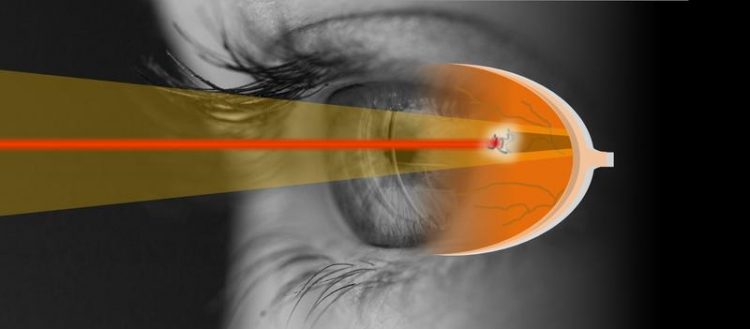Clear vision – project for safer laser treatment of floaters started

The LZH is working on making the laser treatment of vitreous opacities, so-called floaters, safer. Graphic: LZH
Conventional therapies for vitreous opacities in the eye are very risky and can make the situation of those affected even worse. An already existing treatment method, which is not always without complications either, is the laser vitreolysis. The ophthalmologist locates the floaters manually and then vaporizes them with a pulsed laser.
Less energy, better positioning
The LZH Biophotonics Group now wants to further optimize this approach in the XFloater project. On the one hand, they intend to use femtosecond (fs) lasers. The shorter pulse length of the laser radiation would enable them to further reduce the amount of energy introduced into the eye.
In this way, they want to avoid complications such as cataract or glaucoma formation and also enable the use in the rear part of the eye, closer to the retina.
On the other hand, the scientists want to use Optical Coherence Tomography (OCT) to target the laser to the floater without errors. To do this, they also have to compensate the natural aberration of the cornea and lens. They want to use adaptive optics that enable a smaller focal point and higher precision.
Opening up laser use in the rear part of the eye
Until now, there are still many open questions regarding retinal safety when using fs lasers in the rear part of the eye. The Biophotonics Group at the LZH therefore also wants to derive safety parameters in order to expand the field of laser applications in the rear eye segment.
About XFloater
The XFloater project is supported by an advisory board consisting of nine companies, the Hannover Medical School (MHH) and the Augenklinik am Neumarkt as well as the association SPECTARIS. Among others, two LZH spin-off companies are involved, Rowiak GmbH and neoLase GmbH. The IGF project 21011 N / 1 of the Forschungsvereinigung Feinmechanik, Optik und Medizintechnik e. V. (F.O.M.), Werderscher Markt 15, 10117 Berlin, Germany, is funded by the Federal Ministry of Economics and Energy on the basis of a decision of the German Bundestag within the framework of the program for Industrial Collective Research (IGF) carried out by the Arbeitsgemeinschaft industrieller Forschungsvereinigungen „Otto von Guericke“ e.V. (AiF).
Media Contact
More Information:
https://www.lzh.de/en/publications/pressreleases/2020/xfloaterAll latest news from the category: Health and Medicine
This subject area encompasses research and studies in the field of human medicine.
Among the wide-ranging list of topics covered here are anesthesiology, anatomy, surgery, human genetics, hygiene and environmental medicine, internal medicine, neurology, pharmacology, physiology, urology and dental medicine.
Newest articles

A universal framework for spatial biology
SpatialData is a freely accessible tool to unify and integrate data from different omics technologies accounting for spatial information, which can provide holistic insights into health and disease. Biological processes…

How complex biological processes arise
A $20 million grant from the U.S. National Science Foundation (NSF) will support the establishment and operation of the National Synthesis Center for Emergence in the Molecular and Cellular Sciences (NCEMS) at…

Airborne single-photon lidar system achieves high-resolution 3D imaging
Compact, low-power system opens doors for photon-efficient drone and satellite-based environmental monitoring and mapping. Researchers have developed a compact and lightweight single-photon airborne lidar system that can acquire high-resolution 3D…





















